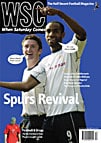 Haydn Parry looks at Gillingham's recent ups and downs
Haydn Parry looks at Gillingham's recent ups and downs
What’s the current state of the relationship between Gillingham fans and the club’s owner?
Paul Scally brought a much needed businessman’s approach when he took us out of receivership in 1995 and has had nothing but relative success since, with the rise to Division One for the first time. Priestfield has also been transformed and is no longer a Victorian curiosity-cum-health hazard. But he has a propensity for PR gaffes: banning for life the unofficial supporters’ club president and maintaining the feud in his programme notes; or changing the home kit from blue to white – a decision swiftly reversed after the fans got restless.
Are home crowds as big as they could get?
Beyond the hard core, Gills fans seem to be among the most fickle. We also lose some support to nearby London clubs – Palace, Millwall and Charlton. We had 43,000 for the big day out at Wembley in 2000 yet the average home gate has declined for the past three years even though this is a high-water mark.
What were your best and worst ever moments?
They came within 12 months of one another. The worst was the 1999 Division Two play-off final against Manchester City. We led 2-0 going into injury time, only for City to score twice and go on to nick it on penalties. It was the most traumatic end to a game I’d witnessed and most fans thought our chance of ever reaching Division One had gone. So the best moment was returning to Wembley next May and finally making it with our own last-gasp winner. Sympathy for opponents Wigan was limited after what we’d gone through the year before.
Who are your biggest rivals and has this changed?
We hated Maidstone United with a passion when they were in the League, but they are sorely missed. Unfortunately, the Stones’ arrival on the scene coincided with a fallow period for the Gills so we tended to come off worst in the derbies. Before that we had a long-running feud with Swindon after some fierce clashes on the pitch in the Seventies – the Rainham End still sing “We hate Swindon”, though we haven’t played in years. Nowadays most antipathy is reserved for Millwall, but I’d hesitate to use the term rivalry where they’re concerned.
Milestones
1893 New Brompton FC is created at a public meeting. Within a year the club turn pro and become a founder member of the Southern League.
1913 Shareholders vote to change the club’s name to Gillingham FC.
1938 The Gills are voted out of the Football League after finishing bottom of Division Three (South) – some upstarts called Ipswich Town replace them. Kent won’t see League football again until the Gills return in 1950.
1947 Gillingham’s ground becomes officially known as Priestfield stadium.
1952 Jimmy Scarth scores a hat-trick against Leyton Orient in two minutes dead – a League record.
1964 Division Four champions.
1987 In the first Division Three play-off final, Gillingham lose to Swindon but only after two legs and a replay at Selhurst Park. The following season the Gills beat Chesterfield 10-0, the club’s record victory.
1993 Gillingham beat Halifax 2-0 on the penultimate day to stay in the League at the expense of the Shaymen.
1995 Paul Scally buys the club. In his first season, with Tony Pulis as manager, the Gills are promoted to Division Two, on the strength of 29 clean sheets from the meanest defence in Football League history.
1999 The Gills let slip a 2-0 lead over Manchester City in the Division Two play-off final with one minute of five minutes of injury time to go. They eventually lose on penalties.
2000 With Peter Taylor at the helm, a 3-2 play-off final win over Wigan Athletic brings First Division-level football to Kent for the first time.
Fondly remembered
Brian Yeo ~ A goalscoring legend in Kent who banged in the goals for the club between 1963 and 1975. The archetypal predatory striker, he terrorised lower league defences for over a decade and his club record haul of 135 league goals is unlikely to be surpassed. Scored 31 in a season, too.
Best forgotten
Mark Halsey ~ Refereed the 1999 play-off final against Man City and added five minutes of injury time, long enough for the scoreline to change from 2-0 to 2-2, paving the way for defeat on penalties. The added time was for the prolonged celebrations that had greeted both our goals.
From WSC 202 December 2003. What was happening this month